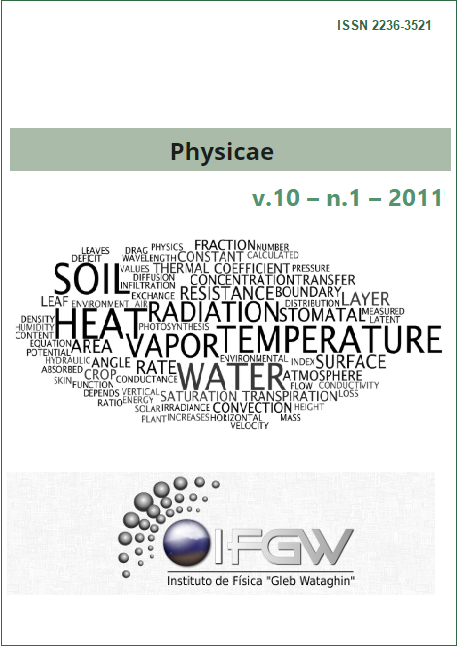Resumo
The Ergodic Hypothesis is a hypothesis in Statistical Mechanics that relates the microscopic motion of particles with the macroscopic average, i. e., the observed property. Despite its importance, didactically its understanding is not easy due to technical issues. Therefore, in this article we propose analogies in order to clarify some important features of the referred hypothesis. Our starting point is the perception that the same macroscopic property, i. e., the average of the movement, can be calculated by different procedures. After that, we build the same average in a more convenient way. We do not have as objectives to contemplate advanced implications of the referred hypothesis. On such cases, some papers will be referenced.
Referências
Sílvio R. Dahmen. A obra de Boltzmann em Física. Revista Brasileira de Ensino de Física, 28:281–295, 2006.
Antonio Augusto P. Videira. Atomismo, energetismo e pluralismo teórico no pensamento epistemológico de Ludwig Boltzmann. Química Nova, 17:461–464, 1994.
R. K. Pathria. Statistical Mechanics. Butterworth-Heinemann, 1996.
W. Greiner, L. Neise, and H. Stöcker. Thermodynamics and statistical mechanics. Springer Verlag, 1995.
Gregory H. Wannier. Statistical Physics. Dover Publications, Inc, 1966.
R. Tolman. The Principles of Statistical Mechanics. Dover Publications, Inc, 1938.
Sydney Chapman and T. G. Cowling. The Mathematical Theory of Non-Uniform Gases. Cambrigde Univeristy Press, 3 edition, 1970.
Richard L. Liboff. Kinetic theory: classical, quantum, and relativistic descriptions. Springer Verlag, 2003.
Stewart Harris. An introduction to the theory of Boltzmann Equation. Dover Publications, Inc, 1971.
N. G. Van Kampen. Stochastic Processes in Physics and Chemistry. Elsevier, 3 edition, 2007.
L. E. Reichl. A Modern Course in Statistical Physics. John Wiley & Sons, Inc, 2 edition, 1998.
César R. de Oliveira and Thiago Werlang. Ergodic hypothesis in classical statistical mechanics. Revista Brasileira de Ensino de Física, 29(2):189–201, 2007.
S. Goldstein, J.L. Lebowitz, R. Tumulka, and N. Zanghì. Long- time behavior of macroscopic quantum systems. The European Physical Journal H, 2010.
Herbert B. Callen. Thermodynamics and an Introduction to Thermostatics. John Wiley & Sons, Inc, 1985.
Steven Kay. Intuitive Probability and Random Processes. Springer, 2006.
Athanasios Papoulis. Probability, Random Variables, and Stochastic Processes. McGraw-Hill, Inc., 1991.
V. I. Arnold. Mathematical Methods of Classical Mechanics. Springer-Verlag, 1997.
Nivaldo A. Lemos. Mecânica Analítica. Livraria da Física, 2004.
Walter F. Wreszinski. Mecânica Clássica Moderna. EDUSP, 1997.
H. Goldstein. Classical Mechanics. Addison-Wesley, 1950.
Adrian Patrascioiu. The ergodic-hypothesis: a complicated problem in Mathematics and physics. Los Alamos Science, Special Issue:263–279, 1987.
Oliver Penrose. Foundations of statistical mechanics: a deductive treatment, page 39. Pergamon Press, 1969.
Colin J. Thompson. Mathematical statistical physics, page 57. Macmillan, 1972.
A publicação é de acesso aberto, sendo os autores responsáveis pelo seu conteúdo. Utiliza-se a licença do Creative Commons para a disseminação da publicação em relação aos direitos autorais.

